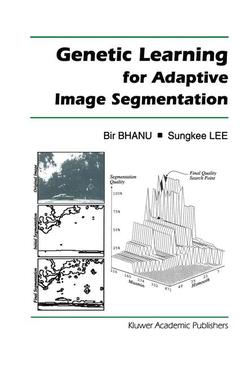Genetic Learning for Adaptive Image Segmentation, Softcover reprint of the original 1st ed. 1994 The Springer International Series in Engineering and Computer Science Series, Vol. 287
Langue : Anglais
Auteurs : Bhanu Bir, Sungkee Lee

Image segmentation is generally the first task in any automated image understanding application, such as autonomous vehicle navigation, object recognition, photointerpretation, etc. All subsequent tasks, such as feature extraction, object detection, and object recognition, rely heavily on the quality of segmentation. One of the fundamental weaknesses of current image segmentation algorithms is their inability to adapt the segmentation process as real-world changes are reflected in the image. Only after numerous modifications to an algorithm's control parameters can any current image segmentation technique be used to handle the diversity of images encountered in real-world applications.
Genetic Learning for Adaptive Image Segmentation presents the first closed-loop image segmentation system that incorporates genetic and other algorithms to adapt the segmentation process to changes in image characteristics caused by variable environmental conditions, such as time of day, time of year, weather, etc. Image segmentation performance is evaluated using multiple measures of segmentation quality. These quality measures include global characteristics of the entire image as well as local features of individual object regions in the image.
This adaptive image segmentation system provides continuous adaptation to normal environmental variations, exhibits learning capabilities, and provides robust performance when interacting with a dynamic environment. This research is directed towards adapting the performance of a well known existing segmentation algorithm (Phoenix) across a wide variety of environmental conditions which cause changes in the image characteristics. The book presents a large number of experimental results and compares performance with standard techniques used in computer vision for both consistency and quality of segmentation results. These results demonstrate, (a) the ability to adapt the segmentation performance in both indoor and outdoor color imagery, and (b) that learning from experience can be used to improve the segmentation performance over time.
Genetic Learning for Adaptive Image Segmentation presents the first closed-loop image segmentation system that incorporates genetic and other algorithms to adapt the segmentation process to changes in image characteristics caused by variable environmental conditions, such as time of day, time of year, weather, etc. Image segmentation performance is evaluated using multiple measures of segmentation quality. These quality measures include global characteristics of the entire image as well as local features of individual object regions in the image.
This adaptive image segmentation system provides continuous adaptation to normal environmental variations, exhibits learning capabilities, and provides robust performance when interacting with a dynamic environment. This research is directed towards adapting the performance of a well known existing segmentation algorithm (Phoenix) across a wide variety of environmental conditions which cause changes in the image characteristics. The book presents a large number of experimental results and compares performance with standard techniques used in computer vision for both consistency and quality of segmentation results. These results demonstrate, (a) the ability to adapt the segmentation performance in both indoor and outdoor color imagery, and (b) that learning from experience can be used to improve the segmentation performance over time.
List of Figures. Preface. 1. Introduction. 2. Image Segmentation Techniques. 3. Segmentation as an Optimization Problem. 4. Baseline Adaptive Image Segmentation Using a Genetic Algorithm. 5. Basic Experimental Results -- Indoor Imagery. 6. Basic Experimental Results -- Outdoor Imagery. 7. Evaluating the Effectiveness of the Baseline Technique -- Further Experiments. 8. Hybrid Search Scheme for Adaptive Image Segmentation. 9. Simultaneous Optimization of Global and Local Evaluation Measures. 10. Summary. References. Index.
This book presents the first closed-loop image segmentation system that incorporates genetic and other algorithms to adapt the segmentation process to changes in image characteristics caused by variable environmental conditions, such as time of day, time of year, weather, etc. Image segmentation performance is evaluated using multiple measures of segmentation quality. These quality measures include global characteristics of the entire image as well as local features of individual object regions in the image.
Date de parution : 12-2012
Ouvrage de 271 p.
15.5x23.5 cm
© 2024 LAVOISIER S.A.S.



